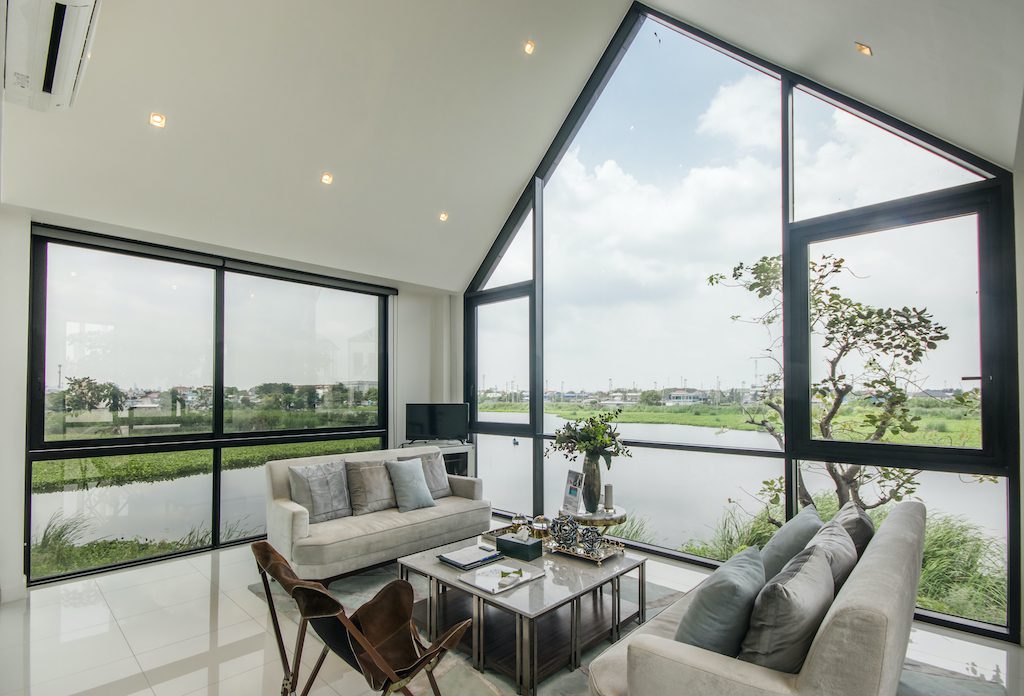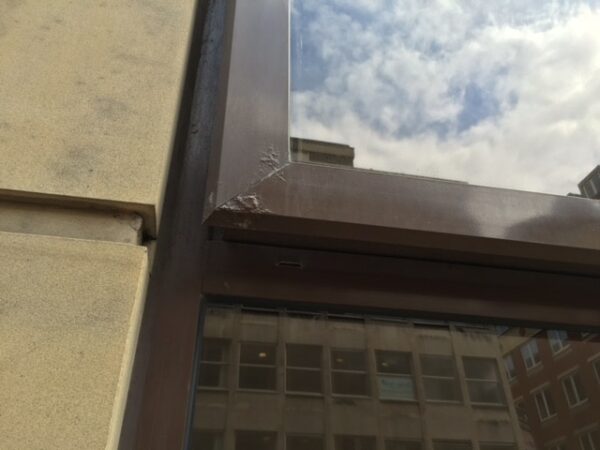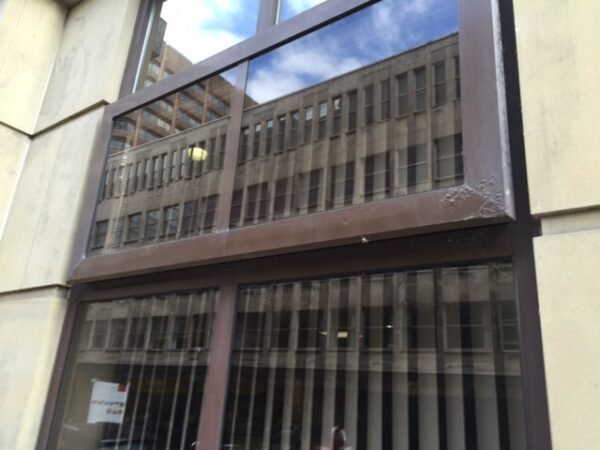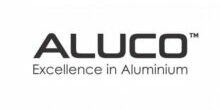What are the best windows for coastal locations? It depends on how the windows are coated, the hardware provided to them and, importantly, the installer you’re working with and what experience they have. Any windows and doors in aluminium will work in coastal locations, but you will need to upgrade their specification in some way.
Why choosing the best windows for coastal locations matters

Any property on a coastal, exposed, or high-level setting is subjected to the extremes of the British weather. These areas tend to be wetter, windier and much harsher than towns and cities. Not only does the exterior of the property get a battering, but so do the windows and doors.
The best windows for coastal locations should be those providing a more durable paint finish such as a marine grade powder coating. Other window products chosen carefully with a professional supplier may come with more durable and corrosion-resistant screws and fittings.
In this article, we provide some tips, advice and a bit of insider knowledge in what you should know about the best windows for coastal locations. This also includes doors, sliding and bifolding doors in these locations too.
What is a severe environment for windows and doors?
Powder manufacturers set guidelines as to what constitutes a severe environment. Examples are city centres, industrial sites, swimming pool environments and coastal locations. As one example Akzo Nobel, leading colour powder manufacturers, say:
A marine environment is any location within 5,000 metres of a coastal shoreline and may also include areas such as estuaries and tidal rivers. A Coastal environment is determined as one that is within 5KM from any coast or estuary.
An industrial environment is any location within 5,000 meters of a source of solid, liquid or gaseous airborne pollution that may cause the degrading of the powder coating.
All powder coatings are required to meet industry standards. These are currently BS EN 12206-1:2004. Powder coating firms may also be Qualicoat Approved. This standard asks for the paint film thickness to be no less than 40 microns and on average no less than 50 microns.
Where windows are to be fitted in marine or industrial environments, guidelines generally state that aluminium components should have a minimum film thickness of 70 microns on all significant surfaces.
Every manufacturer of polyester powder sets out different criteria for the quality of the paint finish in these situations. Syntha Pulvin is another global company making powders. They state that aluminium should be coated to 60 Microns, that only Matt or Metallic matt finishes are used, joints are sealed with an approved mastic and there should be no exposed metal edges. This logically leads to another issue with windows for marine, coastal or swimming pool environments – how they are made.
About polyester powder coated windows and doors.
Polyester powder coating is the most common method of colouring and protecting aluminium. The companies specialising in the powder coating of aluminium extrusions are approved, accredited and inspected by professional organisations that monitor and quality control this particular sector.
All these expert finishing companies pre-treat and paint their windows to British and European standards and work very closely with the global businesses that manufacture the polyester powder itself. The major manufacturers of polyester powder are Valspar, Syntha Pulvin, Axalta, Interpon, IGP and Tiger.
In general terms, the best windows for coastal locations are expertly painted by very experienced companies that specialise in colouring and protecting aluminium and steel for construction, not just windows and doors.
In most cases, standard powder coated aluminium door or window will come with the following paint guarantee:
- Matt finishes 25 years
- Gloss finishes 10-15 years.
These guarantees are on the paint finish only and not on the overall window, operation, or installation. They may vary depending on the colour of the window, the make of the powder used to coat it, the applicator and other factors. That said, these guarantees are perfectly acceptable in the door and window industry and have been in place for over three decades
Where windows are likely to be fitted in more severe environments, a more specific paint application may be required and, consequently, a longer paint guarantee. This is because paint finishes can suffer from being ‘exposed’. While a powder-coated window is protected as standard there may be situations where the normal finish is unacceptable and may fail over time because of its location.
Marine-grade aluminium vs a fully insured finish
Some manufacturers of aluminium windows and front doors market their products as having a marine-grade finish. Marine grade might be the same thickness as an insured paint finish, but it doesn’t have the full coastal guarantee.
Getting a fully insured finish is a more complex process involving your installer, the manufacturer of your windows, and the company painting the aluminium bars.
The process is done by your installer or their manufacturer submitting a marine guarantee request form to the company painting the aluminium profiles. This form details your location, distance from the sea and some other information about the installation. Only the powder coater offers a warranty, subject to a specific cleaning and maintenance routine. It is also worth asking about the type of fixings they provide to the door components where screws, rivets etc are used as these usually need to be a higher grade metal, as do the door handles.
Download the form from the link above to see just how complex the questions are. It’s highly unlikely your regular installer will ask these questions about the location of your windows.
- The decision to provide a marine warranty rests with the powder coater and nobody else.
- There is no certainty that a marine paint guarantee it will be provided just because of the coastal location. These warranties have to be applied for on an individual basis.
- If a warranty is to be issued it will come with conditions such as cleaning schedules.
- Some RAL, Syntha Pulvin or BS colours cannot be given with a warranty.
In very broad terms a door with a marine warranty has a thicker coating of paint, sealed window joints and will be required to be cleaned more often.
Generally speaking, marine and coastal areas are those within 5km of an estuary or saltwater location. A more detailed cleaning method will be required if your doors are between 1/2km and 2km from the coast. You’ll get a reduced warranty for windows and doors that are 1/2km or less from the coast at best. At worst, you will be refused one.
What’s best? Marine-grade or a marine warranty?
Architects working on buildings in coastal locations usually request a fully insured marine warranty. The residential home improvement market may differ, so it’s important to work with a professional installer who understands the difference between marine-grade and marine warranty. It could well be that your installer will choose to offer a guarantee regardless. Alternatively, their terms and conditions may have specific clauses regarding your windows.
If you want to do things the right way, then a marine warranty is the best way to go for absolute peace of mind. Otherwise, ask your installer specifically how you’re covered with your windows and doors.
Commercial window installers know special paint guarantees for their projects and already factor this into their building design and costings. For the grassroots installer, fitting normally painted windows may be sufficient. Your mileage may vary!
Why you need to clean your windows in coastal locations more frequently.
Whether you go with a marine-grade powder coating or a fully insured marine/industrial guarantee, one thing you will need to do far more frequently if you live by the sea, is clean your window frames.
If anyone has to claim under the marine warranty, the powder coater will always want to see documented proof of a routine cleaning and maintenance schedule. Cleaning your windows and doors frequently protects the best windows for coastal locations.
Do windows in coastal locations need to be made differently?
Even the best windows for coastal locations may need a slightly different method of manufacturing to quality for the guarantee.
Aluminium is powder coated in bar lengths. It is painted first, then cut to the required size for making the windows and the doors. It is, therefore, logical that when a saw cuts the painted aluminium bar, it not only leaves exposed edges, but a badly maintained saw and blade can also chip the paint itself.
This might be invisible to the naked eye in most cases, but it does happen. When the two corners of the window are put together there is a risk after they’re installed, that pollutants can get under the paint finish and corrode the paint and the aluminium beneath.
The proper sealing of window joints is a prerequisite with virtually all modern aluminium windows. Where windows are to be fitted in exposed locations it may be necessary to ensure that window joints are sealed with an approved mastic or small gap sealant. Failure to do this can result in the paint finish getting damaged and causing damage to the aluminium window as well. This does not apply to every window. Again working with a professional installer will give you the right answers.


How to get the best windows for coastal locations
So as you can see, many factors are involved in ensuring that the paint finish on aluminium windows is protected and to help ensure a good lifespan for the windows. This is because aluminium powder-coated windows are affected simply by being outside. Abrasion, Salt, Pollutants and Contaminants can all affect the paint finish.
You may be fine with standard coatings; many coastal installations still use standard windows. A marine guarantee provides the most peace of mind. A simple marine-grade coating isn’t the full package.
Find a good installer expert in fitting the best windows for coastal locations. This is the best way of getting the correct advice.
Ask about the quality of handles, screws, external door handles and fixings provided.
Some installers may tell you an insured finish isn’t required. Check your terms and conditions and exactly how your windows are covered during their warranty period.










